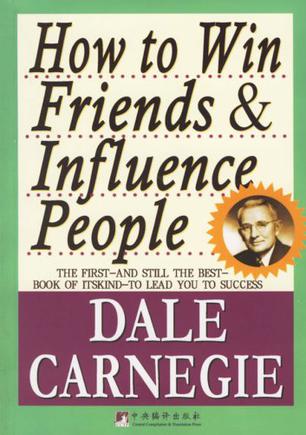-

人性的优点
《人性的优点(英文版)》由卡耐基创作的英文原版图书,在提高英文阅读能力的时候亦能让你对人性的优点有所了解,发挥自己的优势,使自己立于不败之处!使你妥善解决遇到的一些事情。 -

人性的弱点
《人性的弱点(英文版)》是一本可以改变你命运的书,《人性的弱点》在世界各地至少已译成58种文字,全球总销量已达1.5亿余册,拥有4亿读者,除《圣经》之外,无出其右者。《人性的弱点》是名副其实的“人际关系学”培训第一品牌书,被全世界各类企业、网络营销公司、保险公司等各种机构作为培训必读书。 雄心万丈的青年企业家、业务员、家庭主妇、学者、热恋爱的情侣,不管你是什么人,这都是一本让你惊喜,使你思想更成熟、举止更稳重的好书。我们相信这是一本可以改变你命运的书。 -

Out of Control
Out of Control is a summary of what we know about self-sustaining systems, both living ones such as a tropical wetland, or an artificial one, such as a computer simulation of our planet. The last chapter of the book, "The Nine Laws of God," is a distillation of the nine common principles that all life-like systems share. The major themes of the book are: As we make our machines and institutions more complex, we have to make them more biological in order to manage them. The most potent force in technology will be artificial evolution. We are already evolving software and drugs instead of engineering them. Organic life is the ultimate technology, and all technology will improve towards biology. The main thing computers are good for is creating little worlds so that we can try out the Great Questions. Online communities let us ask the question "what is a democracy; what do you need for it?" by trying to wire a democracy up, and re-wire it if it doesn't work. Virtual reality lets us ask "what is reality?" by trying to synthesize it. And computers give us room to ask "what is life?" by providing a universe in which to create computer viruses and artificial creatures of increasing complexity. Philosophers sitting in academies used to ask the Great Questions; now they are asked by experimentalists creating worlds. As we shape technology, it shapes us. We are connecting everything to everything, and so our entire culture is migrating to a "network culture" and a new network economics. In order to harvest the power of organic machines, we have to instill in them guidelines and self-governance, and relinquish some of our total control. -

The Joker
Written by Brian Azzarello Art by Lee Bermejo & Mick Gray Cover by Lee Bermejo In the all-new, hardcover original graphic novel JOKER, writer Brian Azzarello (100 BULLETS) and artist Lee Bermejo (HELLBLAZER covers) - the creative team behind the acclaimed miniseries LEX LUTHOR: MAN OF STEEL - show an even darker and more disturbing side to the most dangerous man in Gotham: The Joker. After yet another stint in Arkham Asylum, The Joker finds "his city" divided among mobsters and costumed villains. Not content to settle for a piece of the pie, The Joker vows to take back the whole damn enchilada by any means necessary. Look for appearances by a slew of Gotham's most wanted, including gritty takes on Two-Face, Riddler, Killer Croc, Penguin, Harley Quinn and even Batman! Not since THE KILLING JOKE have you seen such a powerful tale of The Joker - you won't want to miss this one! Advance-solicited; on sale October 22 - 128 pg, FC, $19.99 US -

The Last Lecture
A lot of professors give talks titled "The Last Lecture." Professors are asked to consider their demise and to ruminate on what matters most to them. And while they speak, audiences can't help but mull the same question: What wisdom would we impart to the world if we knew it was our last chance? If we had to vanish tomorrow, what would we want as our legacy? When Randy Pausch, a computer science professor at Carnegie Mellon, was asked to give such a lecture, he didn't have to imagine it as his last, since he had recently been diagnosed with terminal cancer. But the lecture he gave--"Really Achieving Your Childhood Dreams"--wasn't about dying. It was about the importance of overcoming obstacles, of enabling the dreams of others, of seizing every moment (because "time is all you have...and you may find one day that you have less than you think"). It was a summation of everything Randy had come to believe. It was about living. In this book, Randy Pausch has combined the humor, inspiration and intelligence that made his lecture such a phenomenon and given it an indelible form. It is a book that will be shared for generations to come. -

Here Comes Everybody
A revelatory examination of how the wildfirelike spread of new forms of social interaction enabled by technology is changing the way humans form groups and exist within them, with profound long-term economic and social effects-for good and for ill A handful of kite hobbyists scattered around the world find each other online and collaborate on the most radical improvement in kite design in decades. A midwestern professor of Middle Eastern history starts a blog after 9/11 that becomes essential reading for journalists covering the Iraq war. Activists use the Internet and e-mail to bring offensive comments made by Trent Lott and Don Imus to a wide public and hound them from their positions. A few people find that a world-class online encyclopedia created entirely by volunteers and open for editing by anyone, a wiki, is not an impractical idea. Jihadi groups trade inspiration and instruction and showcase terrorist atrocities to the world, entirely online. A wide group of unrelated people swarms to a Web site about the theft of a cell phone and ultimately goads the New York City police to take action, leading to the culprit's arrest. With accelerating velocity, our age's new technologies of social networking are evolving, and evolving us, into new groups doing new things in new ways, and old and new groups alike doing the old things better and more easily. You don't have to have a MySpace page to know that the times they are a changin'. Hierarchical structures that exist to manage the work of groups are seeing their raisons d'tre swiftly eroded by the rising technological tide. Business models are being destroyed, transformed, born at dizzying speeds, and the larger social impact is profound. One of the culture's wisest observers of the transformational power of the new forms of tech-enabled social interaction is Clay Shirky, and Here Comes Everybody is his marvelous reckoning with the ramifications of all this on what we do and who we are. Like Lawrence Lessig on the effect of new technology on regimes of cultural creation, Shirky's assessment of the impact of new technology on the nature and use of groups is marvelously broad minded, lucid, and penetrating; it integrates the views of a number of other thinkers across a broad range of disciplines with his own pioneering work to provide a holistic framework for understanding the opportunities and the threats to the existing order that these new, spontaneous networks of social interaction represent. Wikinomics, yes, but also wikigovernment, wikiculture, wikievery imaginable interest group, including the far from savory. A revolution in social organization has commenced, and Clay Shirky is its brilliant chronicler.